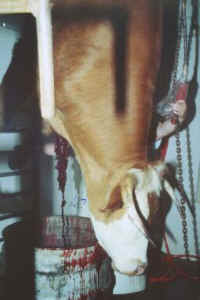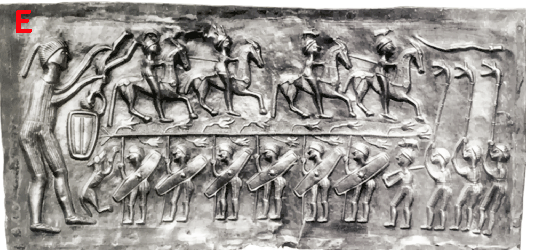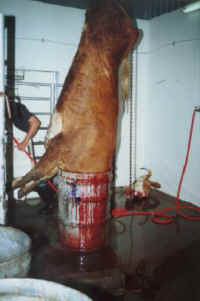The Poetic Edda: A Study Guide
The Speech of the Masked One
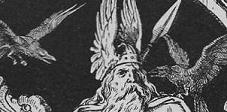
[PREVIOUS][MAIN][NEXT]
[HOME]
MS No. 2365 4to [R]
AM 748 I 4to [A]
Normalized Text:
Ullar hylli
hefr ok allra goða
hver er tekr fyrstr á funa,
því at opnir heimar
verða vm ása sonum,
þá er hefia af hvera.
Ullar hylli
hæfir ok allra goða
hverr er tekr fyrstr á funa,
því at opnir heimar
verða of ása sonum,
þá ær þeir hæfia af hvera.
42. Ullar hylli
hefr ok allra goða
hverr er tekr fyrstr á funa,
því at opnir heimar
verða of ása sonum,
þá er hefja af hvera.
in Icelandic Poetry
“The Song of Grimnir”
in Edda Sæmundar Hinns Frôða
“The Lay of Grimnir”
XLI.
Behold![1] 'midst
circling flames I stand:
The youth who stretch'd his daring hand ---
Him mighty Uller shall applaud,
And crown with favor, ev'ry God.
The great Asori progeny,
Geirrod! shall thy baseness see;
And urg'd at last by Godlike love,
These boiling cauldrons shall remove.
[1]
"Behold!" --- Over the fires which surrounded Odin, the Cooks had put cauldrons
to boil: Odin wished Geirrod or his servants to remove them that the Asori when
they drew near, might at once see and rescue him: or perhaps the coming of the
Asori was all a pretence, meant only to intimidate Geirrod.
42. Ullr’s and all the gods’
favour shall have,
whoever first shall look to the fire;
for open will the dwelling be,
to the Æsir´s sons,
when the kettles are lifted off.
IV. Grímnismál
Le Dits de Grimnir (The Speech of Grimnir)
in Corpus Poeticum Boreale
“The Sayings of the Hooded One”
42. Celui a la faveur d'Ullur, et de
tous les Dieux,
Qui, le premier, place le chaudron sur le feu;
Car les Mondes, autour des Fils des Ases, seraient accessibles
Quand on descendrait les chaudrons.
That one has the favor of Ullur and of all the Gods,
Who first places the cauldron on the fire;
For the worlds, around the Sons of the Aesir, would be accessible
When one would lower the cauldrons.
33. He has the favour of Wuldor and all the Gods who first touches the fire; for all worlds stand open before the Anses' sons when the kettles are lifted.
in Edda Saemundar
“The Sayings of Grimnir”
in The Poetic Edda
“Grimnismol: The Ballad of Grimnir”
(The Kettle is taken off the fire in
Geirrod's hall.)
42. (41) The favour of Ull and of all the Powers
to him touching first the fire !
For gods can enter the homes of men
when the kettle is raised from the hearth. [1]
[1]
So understood by the Copenhagen edition (1848). When the kettle is taken off
the gods can see Odin through the roof opening, come to his rescue, and then
hold a triumphal feast ; see st. 45 (G. J. L.). Dt. HI. explain it in connection
with the strophe -following. The house was set open to guests at meal-time, and
he who thus first invited a god and kindled the friendly hearth fire was
regarded as one of the benefactors of the race.
42. His the favour of Ull and of all the gods
Who first in the flames will reach;
For the house can be seen by the sons of the gods
If the kettle aside were cast.
in The Poetic Edda
“The Lay of Grimnir”
in The Elder Edda
“The Lay of Grimnir”
43. Will Ull[1]
befriend him, and all the gods,
who first the fire quenches;
for open lie to the Æsir all worlds,
when kettles are heaved from the hearth.[2]
[1]
See St. 5 and note [St. 5:
Ull, "Glorious," is the god of archery. His
weapon, the longbow, was made out of the yew. He is, possibly, a hypostasis of
Óthin, or of Tyr, the god of war]
[2]
The words of the second part of the stanza seem clear, but their meaning has so
far resisted convincing explanation.
41
Ull will grace him, the gods also,
Who first reaches the flame:
Open to the gods will all worlds be:
When the cauldrons are carried off.
in The Poetic Edda
“Grimnir’s Sayings”
in The Poetic Edda, Vol. III: Mythological Poems
“The Lay of Grimnir”
42. May he have Ull's protection, and that of all the
gods,
whoever first quenches the flames;
for the worlds lie open for the sons of the gods
when they lift off the kettles. *
42. He has Ullr’s favor
and that of all the gods
who first
brings a cauldron on to the fire
because realms are laid waste
round the Æsir’s sons,
when cooks lift their cauldrons off.
The Elder Edda: A Book of Viking Lore
'The Lay of Grimnir"
42. ‘May he have Ull’s help, and of all the gods,
who first takes hold of the flame;
for worlds fall open to the sons of the Æsir,
when they carry up cauldrons.
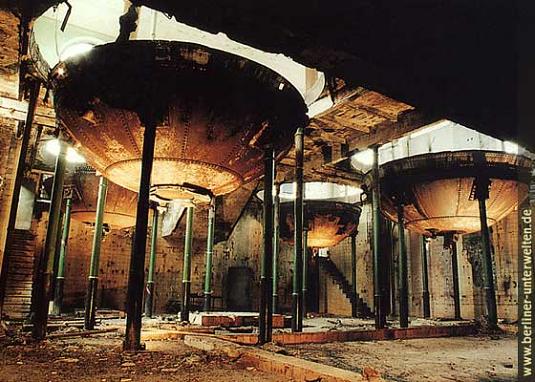
The brewing kettles of Patzenhofer
[HOME][GRÍMNISMÁL]
This stanza is seemingly easy to translate, but notoriously difficult to interpret. Although the meaning of the words are easily understood, the sense of it is not clear. This verse has long puzzled the scholars, as demonstrated in the footnotes to the translations above. Most often, they see it as a reference to eating or hospitality, and the presence of Ull in the verse is discussed.
Because of this uncertainty, a word-study is in order. The stanza, which contains a few slight variants in the manuscripts, reads:
42/ 1:
Ullar = Ull
hylli = favour/ grace
hefr = has/ holds/ uses
42/2:
ok allra goða = and all the gods
42/3:
hverr er tekr fyrstr á funa = [on the one] who first takes hold of/siezes/grasps the flame; [cp. göngumk firr, funi, 'get away from me, flame!' Grímnísmál 1; funi kveykisk af funa, 'fire is kindled from fire', Hávamál 56; metaphorically lust.]
We should remember that Odin is sitting between two fires as he speaks these words, moments (i.e. 4 stanzas) before he reveals his identity.
42/4:
því at opnir heimar [verða] = for worlds open/ are opened
opnir = reflexive to open, be opened
heimar = properly an abode, village, and hence land, region, world: I. abode, land, partly in a mythological sense, each heimr being peopled with one kind of being.
42/5:
of ása sonum, /um ása sonum = to the sons of the Æsir/ by the sons of the Æsir.
42/6:
þá er hefja af hvera/ þá ær þeir hæfia af hvera = when [they] heave/lift/raise off the cauldron
A parallel thought occurs in Hymiskviða 1 (Eysteinn Björnsson translation):
| Ár valtívar
veiðar námu, ok sumblsamir, áðr saðir yrði. Hristu teina ok á hlaut sá: fundu þeir at Ægis ørkost hvera. |
Long ago the battle-gods were hunting (or: feasting on game), and desired ale to drink before they had eaten their fill. They shook the twigs and inspected the sacrificial blood, and discovered at Ægir's an abundance of cauldrons. |
1. valtívar literally means"gods of the battle-slain", and occurs only here and in Völuspá (52, 63), as the conflagration of the world, Ragnarök, unfolds
[I suggest that the term val- is used to liken the sacrifical victim to the sacrifice of a warrior in battle. A similar useage is found of the boar Sæhrimnir in Grímnismál 18].
2. námu veiðar is an ambiguous phrase, which occurs only here. The feminine noun veiðr can mean either "chase, hunt" (thus Völundarkviða 4, 8) or "prey, kill, game" (thus Reginsmál prose: sýndu veiði sína). Subsequently, three meanings seem equally possible: "went hunting, were hunting", "made a kill during hunting, caught game", or "feasted off game".
3. sumblsamir - The word sumbl can mean either "drinking feast" or the "drink, ale" itself.
In symbolic terms, sacrifical blood and beer are identical, cp. Fafnismál 14, hjörlegi, 'sword-liquor'. Lögr, dative legi, [English lager] properly means sea, but is also used of intoxicating drink and blood. Mythologically, the poetic mead is made from Kvasir's blood. The sea too is made from Ymir's blood. In the same vein, Thor drinks from the sea through a drinking horn at Utgard-Loki's. The point of the poem Hymiskviða is to obtain a cauldron large enough to brew beer for all the gods. This kettle is obtained by Thor, who carries it on his head [cauldron = head/skull] as he crosses the sea. The kettle ends up in the possession of Ægir, the sea-god, who uses it to brew beer for the gods at their sacrifical feasts [cauldron = sea]. For the same reason, we find skulls used as drinking vessels in some mythic situations.
The reason that Odin invokes "Ull and all the gods" is moot. Ull may have had a special place in the sacrifical process.
Atlakviða 30 informs us that oaths are sworn on
Ull’s ring (among other things). This practice is best described in
Landnámabók (Hauksbók 268). There, the ring needed to be
at least two ounces or more and reddened by blood of the sacrificial
animal. It was to be worn by the hof-goði at all assemblies,
and when not in use it would lay on the stalli. Every man
who had a case in the Thing was required to swear an oath on this ring
and name two witnesses. The oath was worded thus: "I name [the two
witnesses] witnesses herein, that I take an oath on the ring, a lawful
oath, ---so help me Frey and Njörd and the Almighty Ás, as I shall
pursue (or defend) this suit, or bear witness, or give verdict or
judgment, according to what I know to be most right and true and in
accordance with the law." An account in Víga-Glúms Saga agrees
with this very closely. There, the man was required to take the oath on
a silver ring of not less than three ounces which had been dipped in the
blood of an ox. In Eyrbyggja Saga the oath ring is
described as silver, and weighing 20 ounces. During feasts, the goði
wore it on his arm. In a description of Thórólf's hof in Iceland, the
ring is described as being 2 ounces, and worn on the finger of the goði
at all assemblies.
The Anglo-Saxon Chronicle gives an example of an oath ring being
used by the Danes in 876.
Besides this, Ull in particular may be invoked in Grímnismál 42 because of his association with the hunt. As Sif's son, he can be seen as a fertility god, and provider of food. His mother's hair, shorn by Loki, is often equated to fields of grain. Ull is the god of snow-shoes and the bow and arrow (Gylfaginning 31), the same equipment used by the three elven brothers in Völundarkviða to hunt bear to eat. Ull is most likely of the same clan ( i.e. the alfr, see Grímnismál 5). His home is said to lie between Thor's estate and Alfheim, the land of the elves. In Hymiskvida 7, Thor drives his goats a day's distance and arrives "at Egil's", where he leaves his goat-drawn chariot behind and spends the night "at rest" before heading into Jötunheim on foot. Egil is a brother of the elf-prince Völund in the Eddic poem Völundarkviða. While often classified as a heroic poem, Völundarkviða is actually placed with the Thor poems in the Codex Regius collection falling between Thrymskviða and Alvísmál.
From the context of Hymiskvida, it becomes clear that Egil's house is the same place Thor obtains his servants Thjalfi and Röskva, when young Thjalfi is tricked into breaking one of the bones of the goat's leg in order to suck out the marrow (Hymiskviða 37, 38). The full tale is told in Gylfaginning 44:
|
Öku-Þórr fór með hafra sína ok reið ok með honum sá áss, er Loki er heitir. Koma þeir at kveldi til eins búanda ok fá þar náttstað. En um kveldit tók Þórr hafra sína ok skar báða. Eftir þat váru þeir flegnir ok bornir til ketils. En er soðit var, þá settist Þórr til náttverðar ok þeir lagsmenn. Þórr bauð til matar með sér búandanum ok konu hans ok börnum þeira. Sonr búanda hét Þjálfi, en Röskva dóttir. Þá lagði Þórr hafrstökurnar útar frá eldinum ok mælti, at búandi ok heimamenn hans skyldu kasta á hafrstökurnar beinunum. Þjálfi, sonr búanda, hélt á lærlegg hafrsins ok spretti á knífi sínum ok braut til mergjar. Þórr dvalðist þar of nóttina. En í óttu fyrir dag stóð hann upp ok klæddi sik, tók hamarinn Mjöllni ok brá upp ok vígði hafrstökurnar. Stóðu þá upp hafrarnir, ok var þá annarr haltr eftra fæti. Þat fann Þórr ok talði, at búandinn eða hans hjón myndu eigi skynsamliga hafa farit með beinum hafrsins. Kennir hann, at brotinn var lærleggrinn. Eigi þarf langt frá því at segja. Vita mega þat allir, hversu hræddr búandinn mundi vera, er hann sá, at Þórr lét síga brýnnar ofan fyrir augun, en þat er hann sá augnanna, þá hugðist hann falla mundu fyrir sjónum hans einum saman. Hann herði hendrnar at hamarskaftinu, svá at hvítnuðu knúarnir. En búandinn gerði sem ván var ok öll hjúnin, kölluðu ákafliga, báðu sér friðar, buðu at yfirbótum allt þat, er þau áttu. En er hann sá hræðslu þeira, þá gekk af honum móðrinn, ok sefaðist hann ok tók af þeim í sætt börn þeira, Þjálfa ok Röskvu, ok gerðust þau þá skyldir þjónustumenn hans, ok fylgja þau honum jafnan síðan. |
Öku-Thor drove forth with his he-goats and chariot, and with
him that Ás called Loki; they came at evening to a husbandman's,
and there received a night's lodging. About evening, Thor took
his he-goats and slaughtered them both; after that they were
flayed and borne to the caldron. When the cooking was done, then
Thor and his companion sat down to supper. Thor invited to meat
with him the husbandman and his wife, and their children: the
husbandman's son was called Thjálfi, and the daughter Röskva.
Then Thor laid the goat-hides farther away from the fire, and
said that the husbandman and his servants should cast the bones
on the goat-hides. Thjálfi, the husbandman's son, was holding a
thigh-bone of the goat, and split it with his knife and broke it
for the marrow. |
Ull's stepfather, Thor wields the hammer used to hallow brides, to crush the heads of giants (symbolically likened to "calves", Þórsdrápa 19/1-4), and to resurrect his goats, which can be slaughtered and eaten when he travels. In ritual sacrifice, the victim is commonly struck on the head with a blunt object, such as a hammer, before being drained of its blood and beheaded. The cattle skulls found at the Hofstaðir site bear evidence of blunt force trauma to their foreheads (see Grímnismal 40-41). Mythologically, Thor's hammer performs the same function. Raising his hammer, Thor brings death to the sacrical victim, and simultaneously strengthens or returns life with the same gesture.
Each sacrifice is seen as a reenactment of the sacrifice of Ymir, renewing and strengthening the gods and the world they protect. In a very real sense, the food obtained from the ritual slaughter of animals (and to some extent the ritual harvesting of plants) physically strengthens and sustains the human body. On the cosmic level, the world itself is seen as a human body, having been created from the corpse of Ymir, the first anthropomorphic being. The lifting off of the cauldron (hefja af hvera) might be an allusion to the decapitation of the sacrifical victim, as the head, the breweing cauldron, the beer-cup, and the hlaut-bowl used to catch the blood of the victim are all interchangeable in symbolic parlance. [See The Symbolism of Sacrifice for further examples].
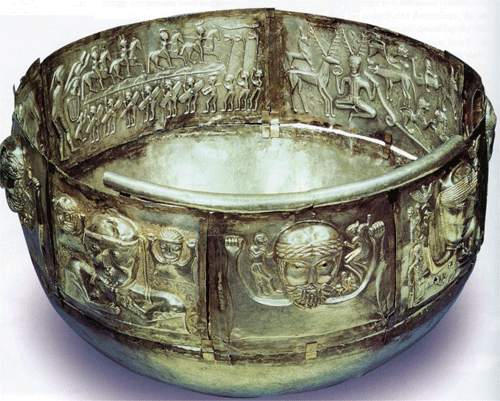 |
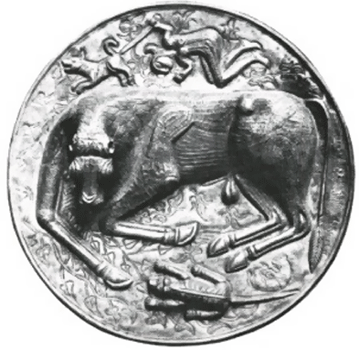 |
|||
|
||||
|
Það var forn siður þá er blót
skyldi vera að allir bændur skyldu þar koma sem hof var og
flytja þannug föng sín, þau er þeir skyldu hafa meðan veislan
stóð. Að veislu þeirri skyldu allir menn öl eiga. Þar var og
drepinn alls konar smali og svo hross en blóð það allt er þar
kom af, þá var kallað hlaut og hlautbollar það er blóð það stóð
í, og hlautteinar, það var svo gert sem stökklar, með því skyldi
rjóða stallana öllu saman og svo veggi hofsins utan og innan og
svo stökkva á mennina en slátur skyldi sjóða til mannfagnaðar.
Eldar skyldu vera á miðju gólfi í hofinu og þar katlar yfir.
Skyldi full um eld bera en sá er gerði veisluna og höfðingi
var, þá skyldi hann signa fullið og allan blótmatinn. Skyldi
fyrst Óðins full, skyldi það drekka til sigurs og ríkis konungi
sínum, en síðan Njarðar full og Freys full til árs og friðar. Þá
var mörgum mönnum títt að drekka þar næst bragafull. Menn drukku
og full frænda sinna, þeirra er heygðir höfðu verið, og voru það
minni kölluð. |
It was the olden custom that when a blood-offering should be, all the bonders should come to the place where was the Temple, bringing with them all the victuals they had need of while the feast should last; and at that feast should all men have ale with them. There also was slain cattle of every kind, and horses withal; and all the blood that came from them was called hlaut, but hlaut-bowls were they called wherein the blood stood, and the hlaut-tein a rod made in the fashion of a sprinkler. With all the hlaut should the stalls of the gods be reddened, and the walls of the temple within and without, and the men-folk also besprinkled; but the flesh was to be sodden for the feasting of men. Fires were to be made in the midst of the floor of the temple, with cauldrons thereover, and the health-cups should be borne over the fire. But he who made the feast and was the lord thereof should sign the cups and all the meat; and first should be drunken Odin's cup for the victory and dominion of the king, and then the cup of Niord and the cup of Frey for plentiful seasons and peace. Thereafter were many men wont to drink the Bragi-cup; and men drank also a cup to their kinsmen dead who had been noble, and that was called the cup of Memory. |
A more elaborate sacrifice, probably for the weal of the world, was performed every nine years at the temple at Old Uppsala. Adam of Bremen describes the ritual in the 4th book of his Gesta Hammaburgensis, chapter 27. The Chronicon of Thietmar of Merseburg describes a similar ritual in Chapter 17.
[PREVIOUS][MAIN][NEXT]
[HOME]
